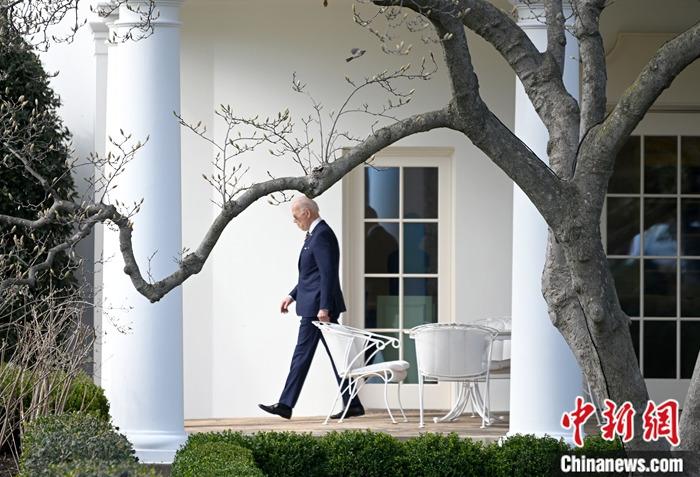(Finance and Economics) What does it mean for the United States and Europe to cancel the most-favored-nation treatment for Russia?
China News Agency, Beijing, March 12 (Reporter Li Xiaoyu) Sanctions against Russia have been escalated again.
U.S. President Biden announced on the 11th local time that the United States will work with the G7 and the European Union to cancel the most-favored-nation treatment for Russia.
On March 8, local time, US President Biden was at the White House.
Photo by China News Agency reporter Chen Mengtong
On the same day, the White House also released a joint statement of the leaders of the Group of Seven (G7) countries, announcing that the seven countries will cancel Russia's most-favored-nation status in accordance with their domestic procedures.
The so-called most-favored-nation treatment refers to the preferential treatment given to any other country by a member of the World Trade Organization (WTO) in the fields of trade in goods, trade in services and intellectual property rights, and must be immediately and unconditionally given to other members.
The cancellation of Russia's most-favored-nation status by the United States means that Russian goods exported to the United States will no longer be able to apply low tariff rates, and their competitiveness will be greatly reduced.
But in fact, the United States is not Russia's main export market.
Among Russia's top 10 export markets in 2019, China ranked first, accounting for 13.4%, while the United States was outside the top 10.
Under this circumstance, the cancellation of Russia's most-favored-nation status by the United States has limited impact on Russia's trade.
However, considering that the EU is Russia's largest trading partner, and the Netherlands and Germany are the second and third major export markets of Russia, if the EU cancels Russia's most-favored-nation status, Russia's exports to the EU will inevitably suffer.
Bai Ming, deputy director of the International Market Research Institute of the Institute of International Trade and Economic Cooperation of the Ministry of Commerce, said in an interview with a reporter from China News Agency that the export of oil and natural gas and other resources is the most important part of Russia's foreign trade.
Now Russia's oil and gas exports have been restricted or even banned, and the cancellation of the most-favored-nation treatment means that other Russian commodity exports are also targeted, and Russia's trade will be further under pressure.
Some analysts believe that most-favored-nation treatment is one of the core principles of the WTO.
The cancellation of the most-favored-nation treatment for Russia is actually another "exclusion" and "decoupling" of the Russian economy, and it is also a blow to economic globalization.
So far, the United States and Europe have imposed a number of economic sanctions on Russia.
In addition to excluding some Russian banks from the Society for Worldwide Interbank Financial Communication (SWIFT) payment system, the United States and Europe have also taken drastic measures against oil and gas exports, the lifeblood of the Russian economy.
The United States announced that it would stop importing oil, natural gas and coal from Russia.
The European Union also announced plans to reduce its reliance on Russian gas by two-thirds this year.
Scholars in Beijing believe that the sanctions, which may seem severe, have limited impact on the Russian economy.
It is the United States that "fires", and it is Europe that really bears the losses.
Chen Fengying, a researcher at the China Institute of Contemporary International Relations, said in an interview with a reporter from China News Agency that the US-Russia trade volume is only more than 20 billion US dollars a year, and the EU is Russia's largest trading partner.
Compared with the United States, the economic and trade ties between the EU and Russia are much closer.
Therefore, by imposing economic sanctions on Russia, the EU is "injuring the enemy by one thousand and self-defeating eight hundred", while the impact on the US economy is much smaller.
Chen Fengying said bluntly that the United States is actually the biggest behind-the-scenes beneficiary by taking advantage of sanctions to kick out Russian pipeline natural gas and compete for the European natural gas market, while attracting the return of global capital.
(over)

